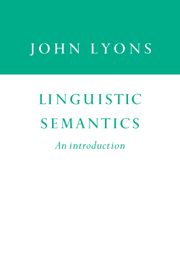Summary
This book started life as a second edition of Language, Meaning and Context (1981) and, regrettably, in several places has been announced as forthcoming under that title. It now appears with a completely different title because, in the event, it has turned out to be a very different book. It is much longer; it deals with several topics that were not dealt with at all in the earlier book; and, above all, it is written at a different level and in a different style.
Many of these differences derive from the fact that Linguistic Semantics (LS), unlike its predecessor (LMC), is intended to be used as a textbook for courses in semantics given in departments of linguistics (and related disciplines) in colleges and universities. Although LMC was not conceived as a textbook, it was quite widely used as such, until it went out of print some years ago. I hope that LS, being written especially for students of linguistics, will prove to be much more satisfactory for this purpose.
In revising the original text, apart from taking account of such recent developments as seemed to me to be relevant to what is presented as an introduction to the subject, I have found myself obliged to add several new sections and to rewrite or expand others.
Information
- Type
- Chapter
- Information
- Linguistic SemanticsAn Introduction, pp. xi - xviPublisher: Cambridge University PressPrint publication year: 1995
